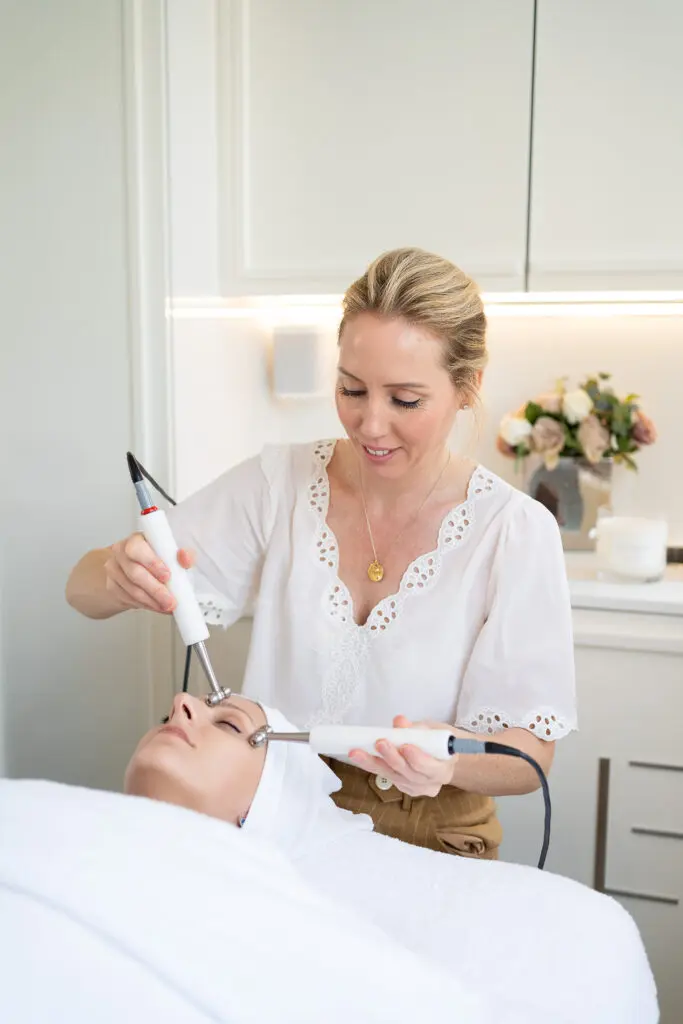Lisa Franklin discusses the connection of Menopause and Rosacea


Skin expert Lisa Franklin says: ‘Managing and treating rosacea for menopausal skin involves a thorough approach that includes proper skincare, lifestyle changes, identifying and avoiding triggers, and utilising in clinic CACI treatments.’
She highlights the importance of ‘consulting with a skin specialist to tailor a treatment plan based on the severity and specific symptoms of your rosacea,’ saying: ‘It may take time to find the most effective treatment plan for your specific symptoms, so work closely with your skin specialist to achieve the best results.’
Her top tips for soothing and calming rosacea flare ups during menopause:
Identify and Avoid Triggers: Identify and avoid triggers that worsen your rosacea symptoms, such as spicy foods, alcohol, hot beverages, sun exposure, extreme temperatures, stress, and harsh chemicals.
Gentle Skincare: During and after menopause, there’s a decline in collagen production, which can lead to thinning skin and increased visibility of blood vessels, potentially worsening the appearance of rosacea. Use gentle mild cleansers, fragrance-free moisturisers, and at least SPF 30 to protect your skin from UV rays.
Good Cleansing: Cleanse your face both morning and night and avoid excessive scrubbing that can irritate your skin.
Treatments products: The hormonal fluctuations (including a decrease in oestrogen levels) of menopause can influence the skin’s sensitivity and reactivity. These can also trigger or exacerbate rosacea flares. These fluctuations contribute to microinflammation, vasomotor instability when blood vessels in the skin dilate more easily, resulting in flushing and redness. Look for products that including niacinamide or azelaic acid which can help reduce redness, inflammation associated with rosacea.
Light Therapy: LED light therapy treatments [CACI TIP: incorporated in CACI Synergy SPED technology] can effectively reduce redness and visible blood vessels associated with rosacea. Blue light is particularly calming on skin inflammation.
Moisturise: Keep your skin hydrated, as rosacea can often cause dryness and irritation. [CACI TIP: We recommend applying a targeted line-reducing serum like CACI Amino Lift Peptide Complex under a daily moisturiser and CACI Hydro Mask once a week]
Cool the skin: Apply something cool such as a cool compress or cooling device [CACI TIP: CACI’s Purifying Silver Mask also work wonders to calm and soothe skin especially if stored in the fridge] to help alleviate facial redness and discomfort.
Dietary Changes: Consider keeping a food diary to track how your diet may affect your rosacea. Some individuals find relief by avoiding spicy foods, hot beverages, alcohol and foods high in histamines – these can exacerbate menopausal symptoms.
Stress Management: Menopause can bring about significant stress due to the physical and emotional changes women experience. Stress is a known trigger for rosacea flare-ups. Practice stress-reducing techniques such as yoga, meditation, deep breathing exercises, or any activity that helps you relax [HINT: Book a stress-reducing CACI professional facial treatment such as Skin Calm or Hydratone].




